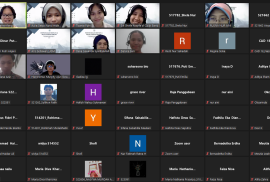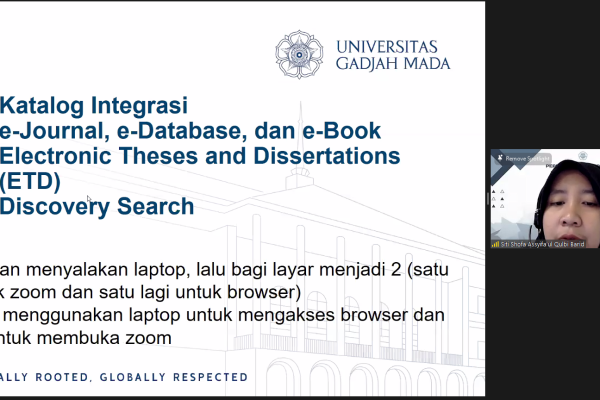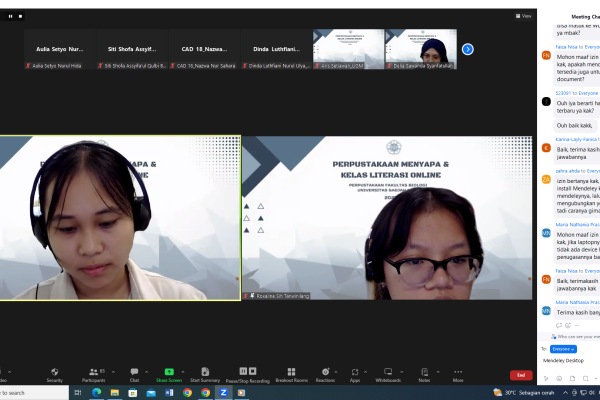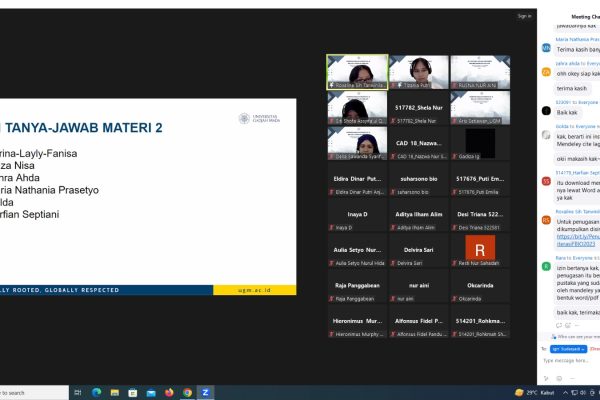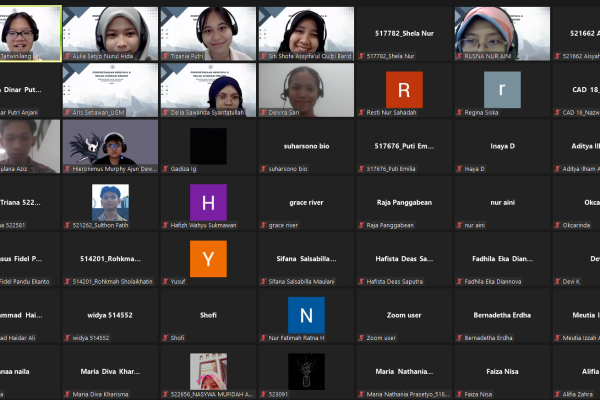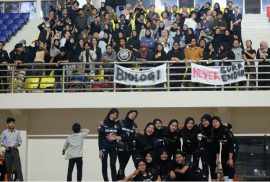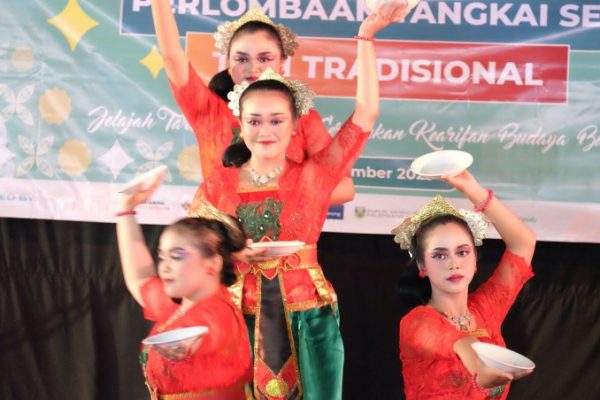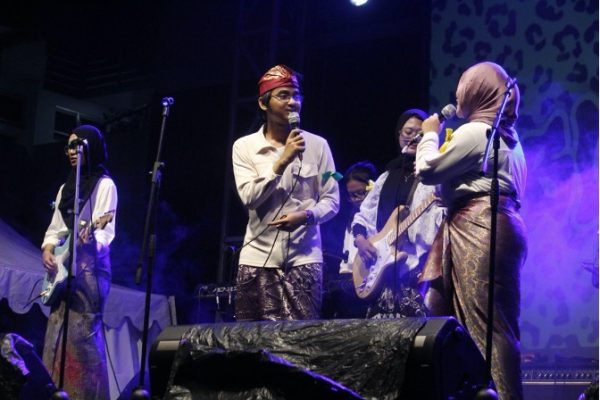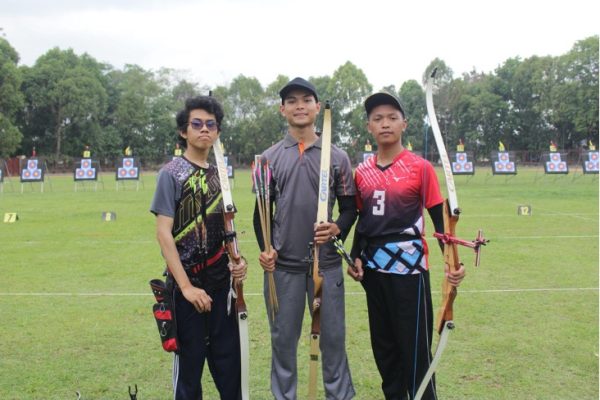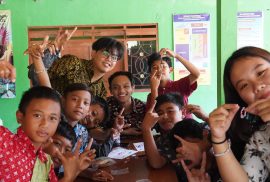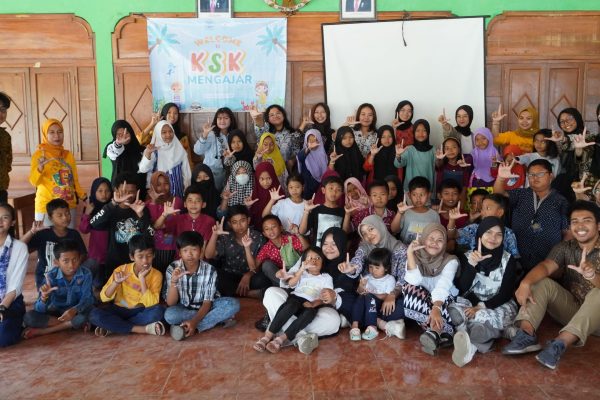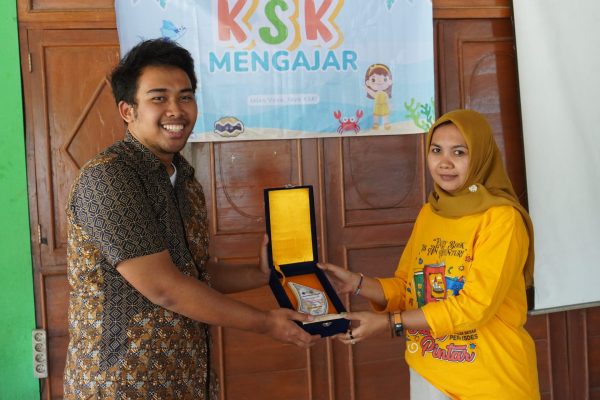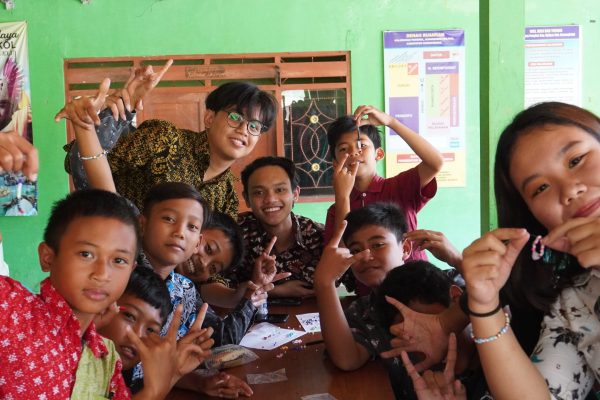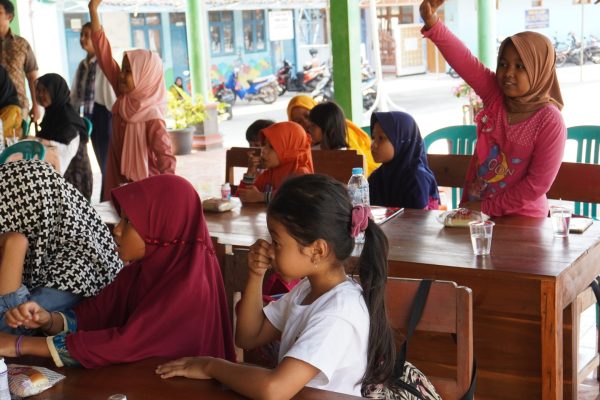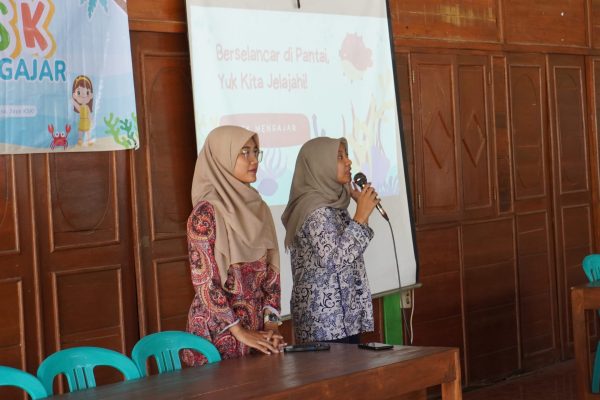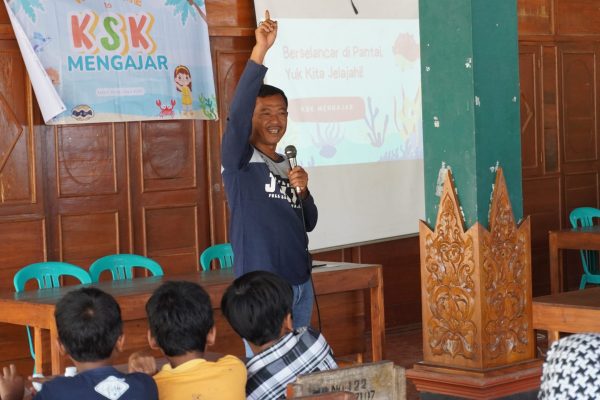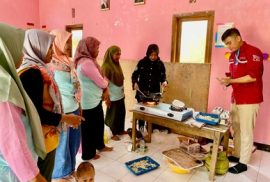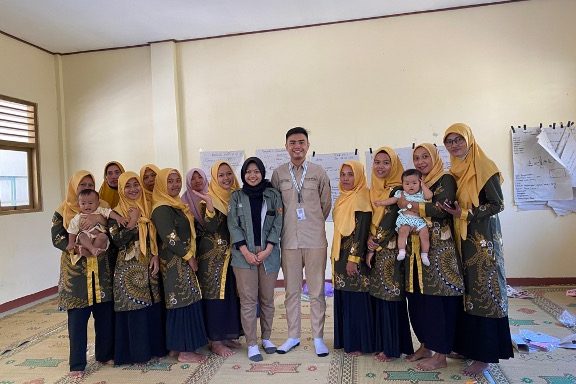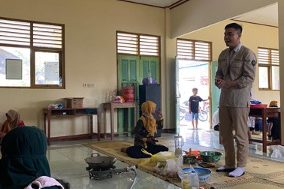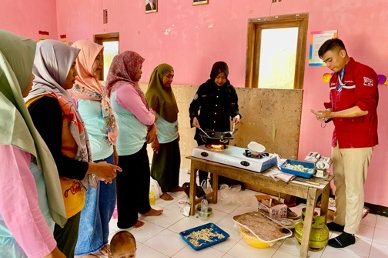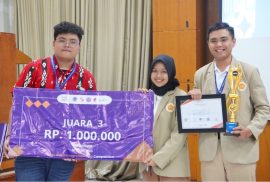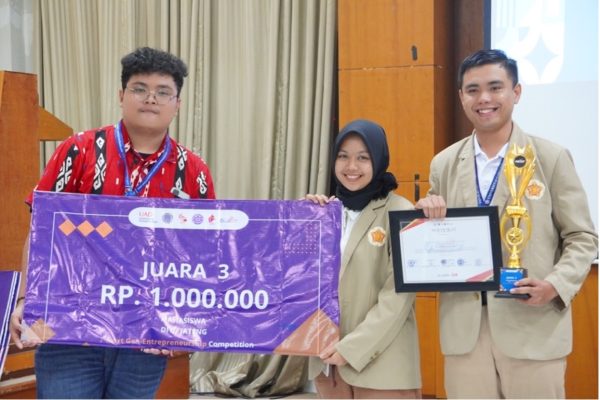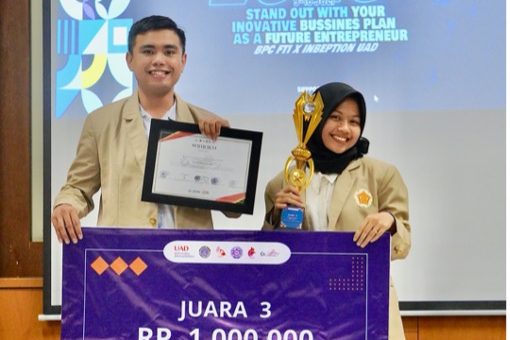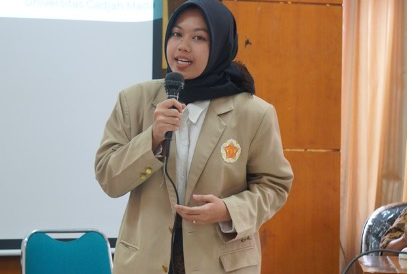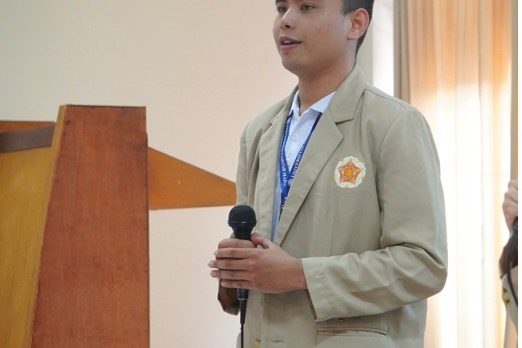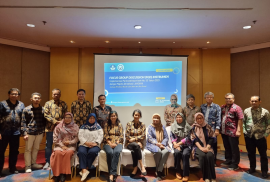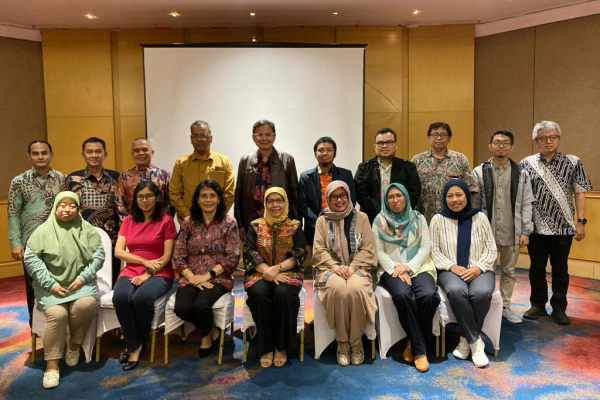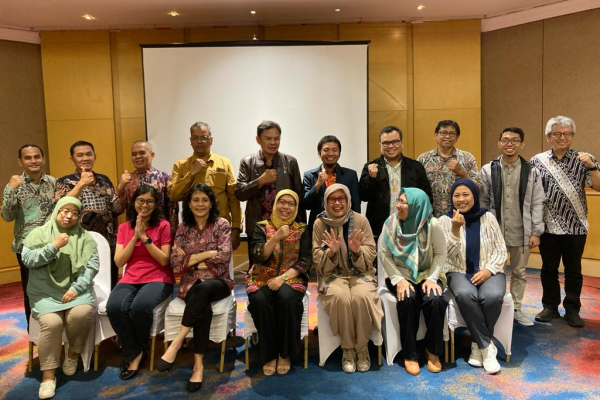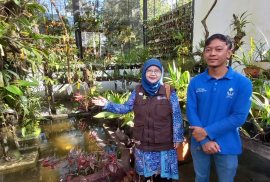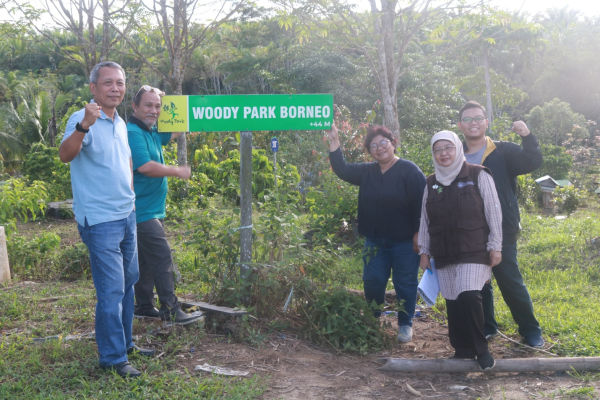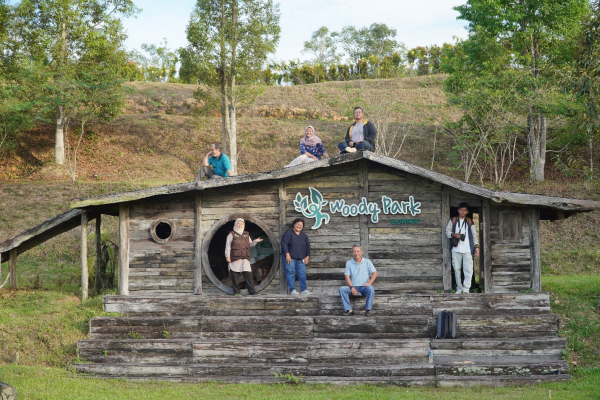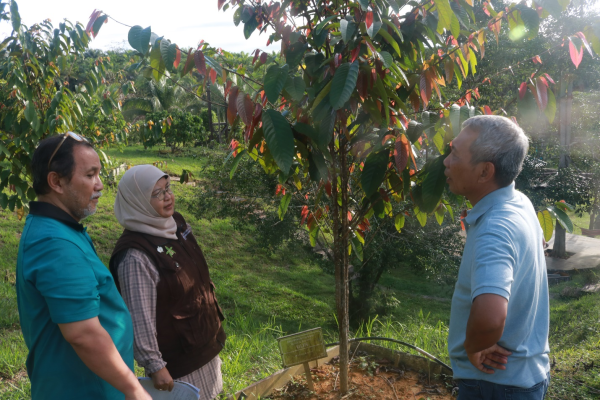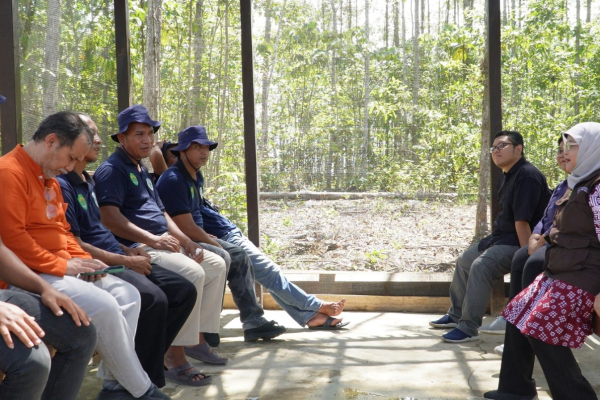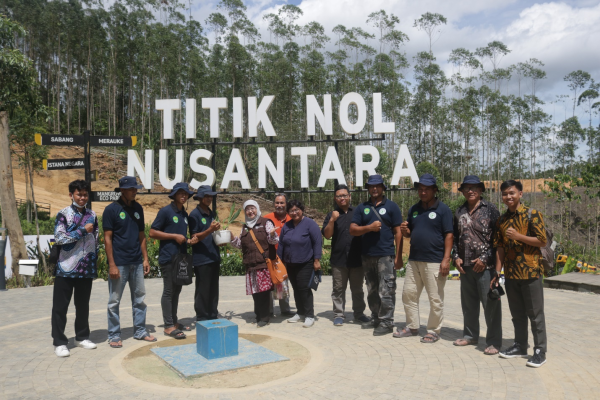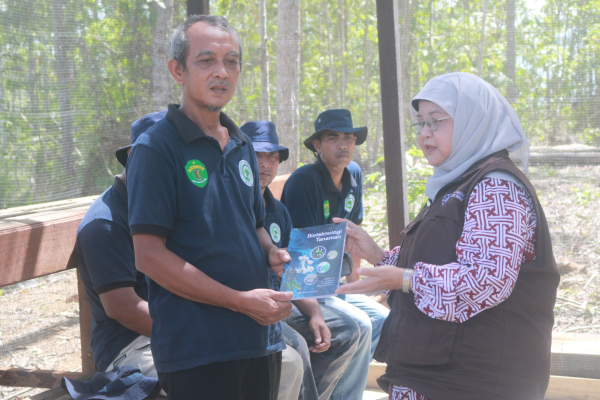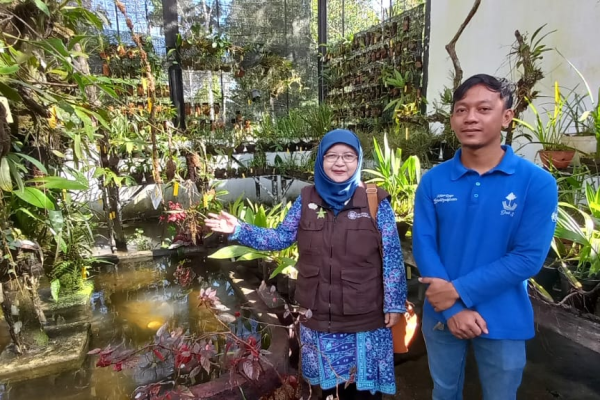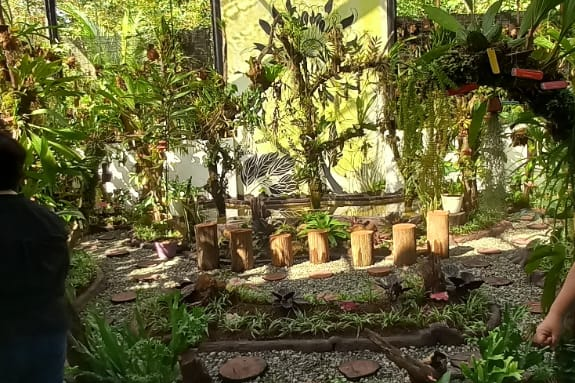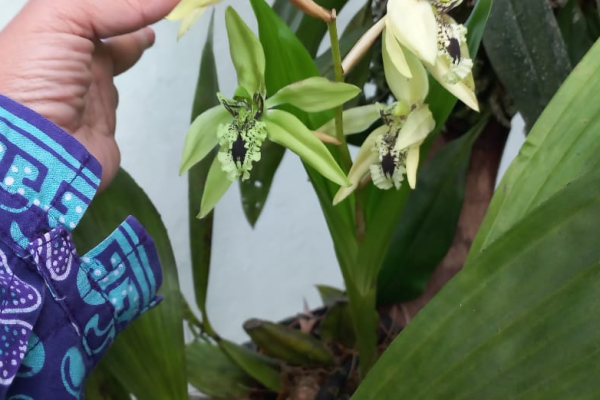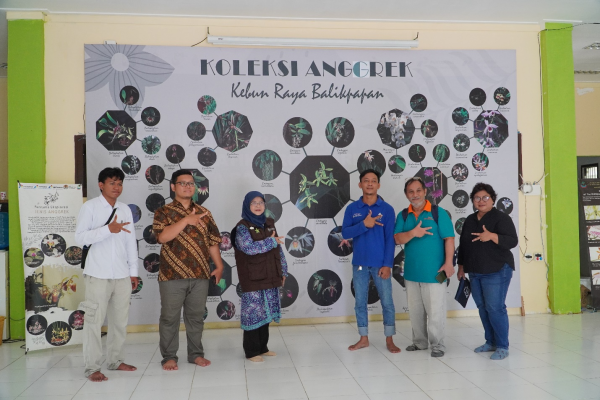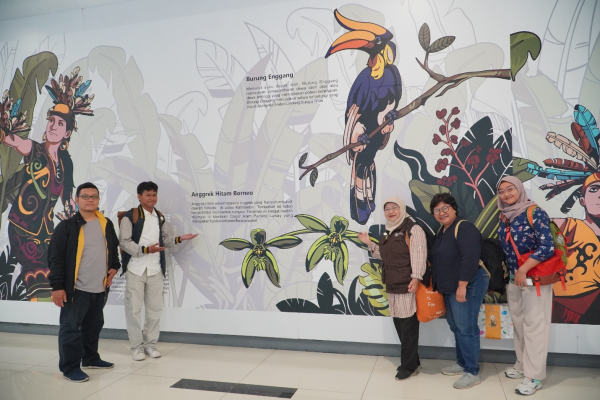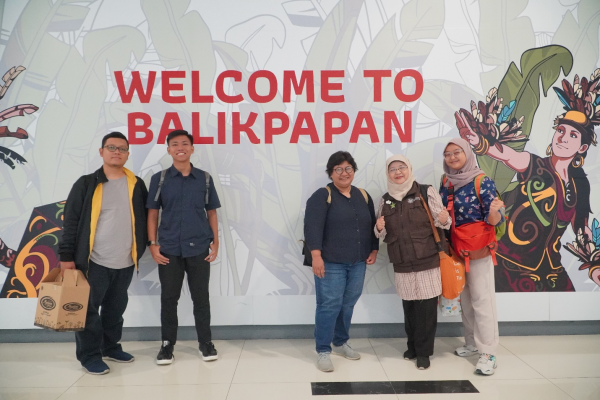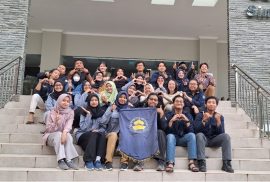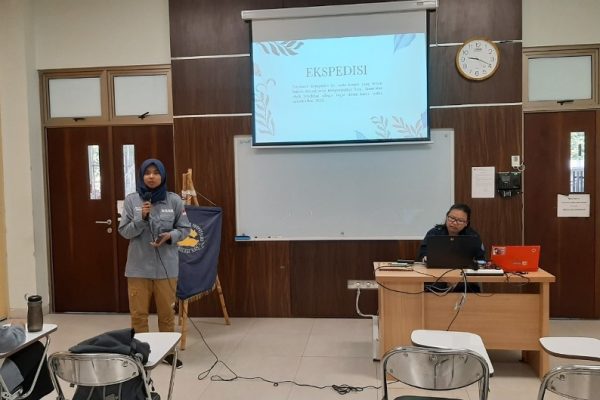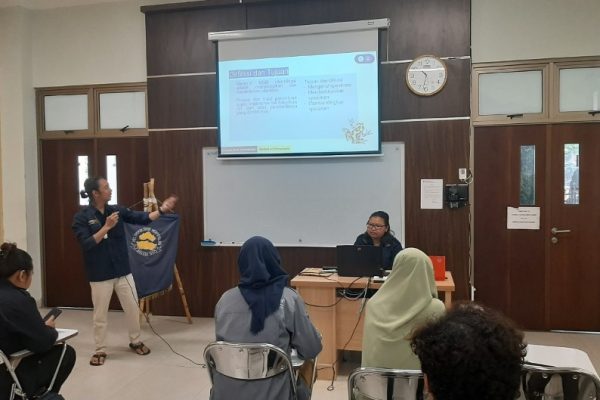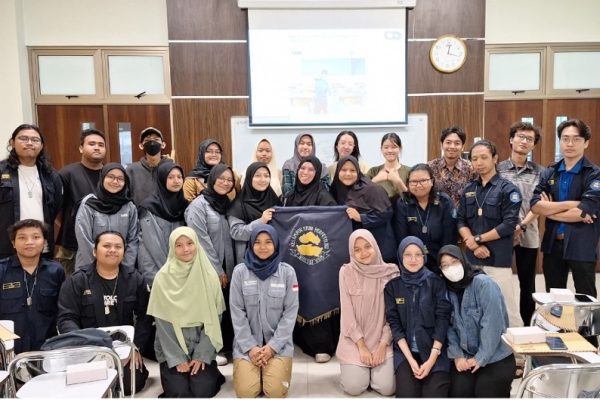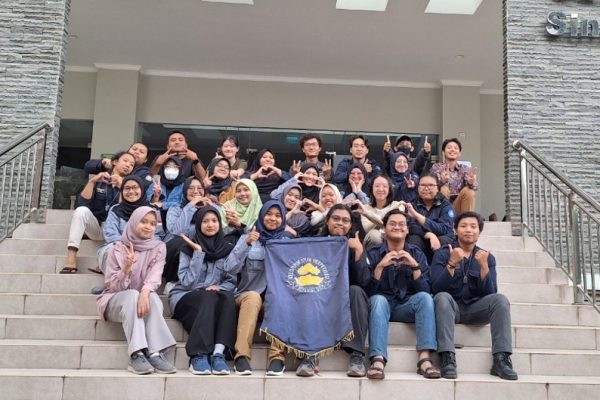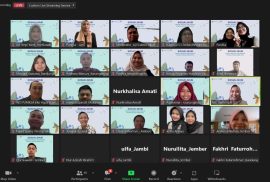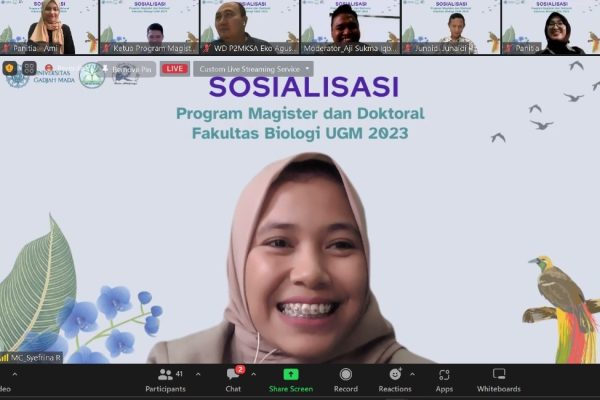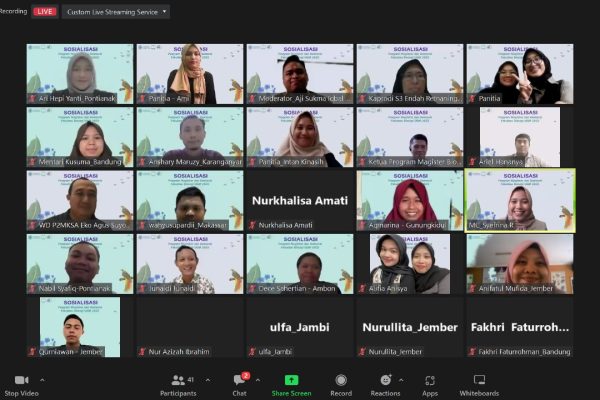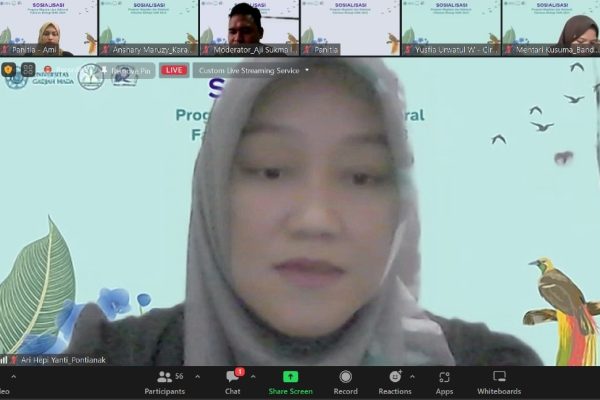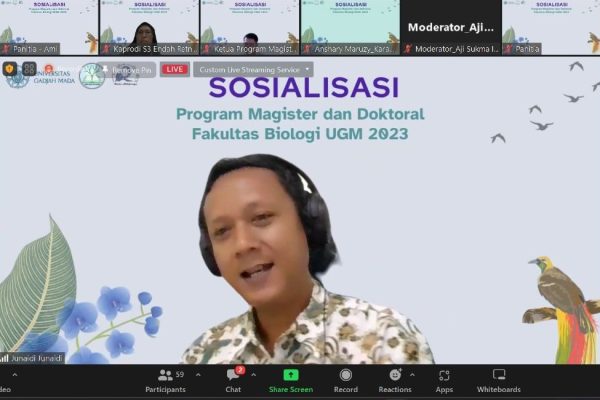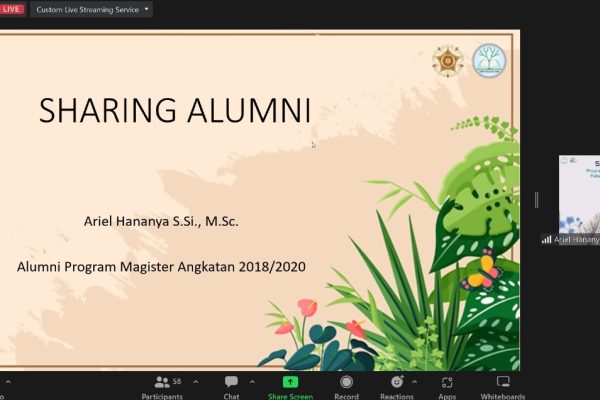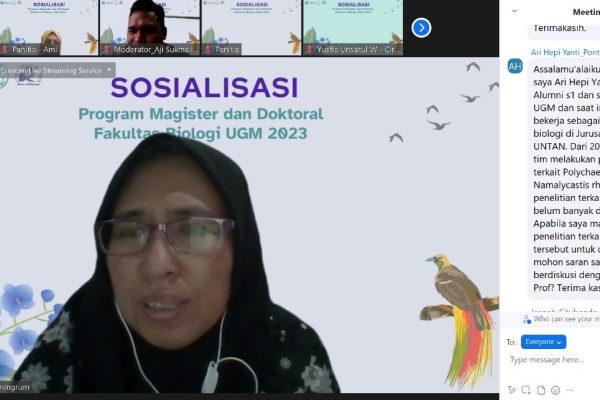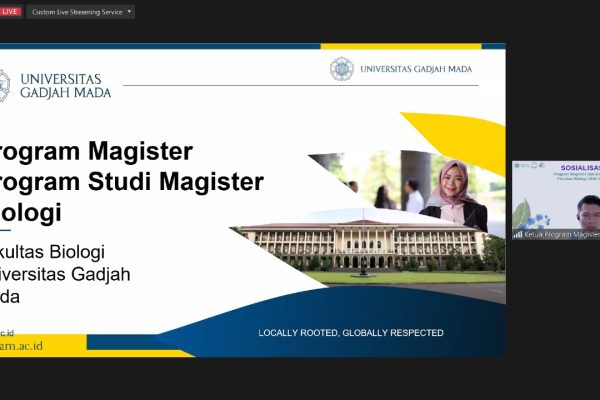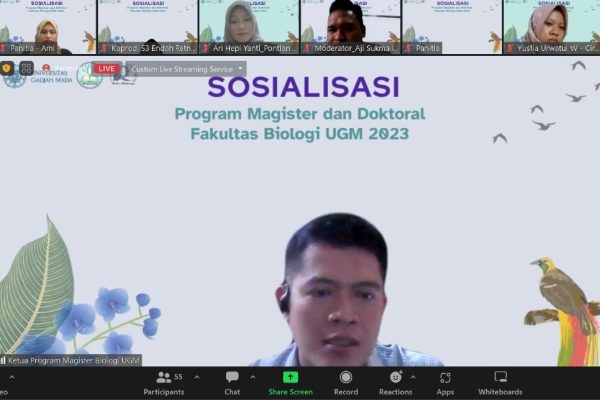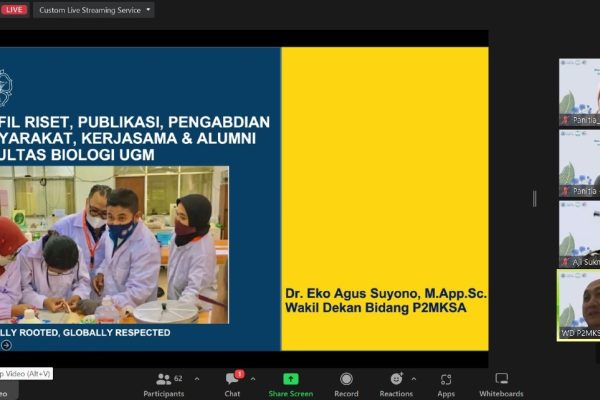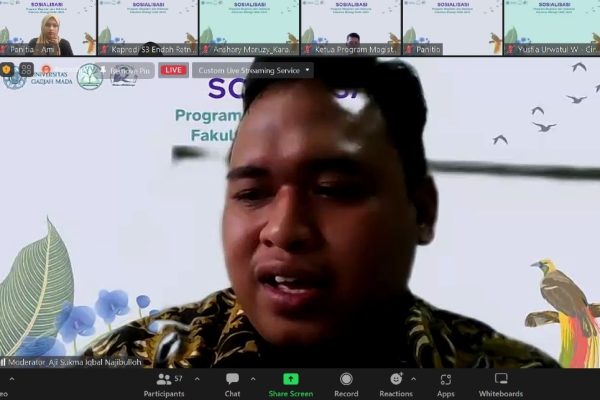On Saturday, December 16, 2023, the Faculty of Biology Library, along with the volunteer team, organized an event called “Library Welcomes and Online Literacy Class” to welcome the new students of the 2023 Bachelor’s Program in the Faculty of Biology. The event was conducted online from 08:00 to 14:30, with the discussion session ending at 11:00 and followed by an assignment session with a submission deadline at 14:30. This activity included training on Bio-Digilib Application Introduction, accessing e-resources, and Mendeley citation management. The event commenced with an opening by Roxaline Sih Tanwinilang and continued with a welcoming address by the Faculty of Biology Librarian, Mrs. Rusna Nur Aini. Mrs. She hopes that the 2023 students will possess publication skills and digital literacy that will be beneficial in supporting them throughout their studies and future careers.
The activity was divided into two sessions. The first session was conducted by the library volunteer team, Siti Shofa Assyifa’ul Qulbi Barid, introducing the Faculty of Biology UGM Library Unit under the supervision of Drs. Ign. Sudaryadi, M.Kes. located on the 3rd floor of Building B in the Faculty of Biology, provides both offline and online services. Among the facilities offered are circulation rooms, an ETD (Electronic Theses and Dissertations) room, computer labs, lockers, and more. The Biology Library’s program activities encompass various initiatives such as talk shows, book discussions, open recruitment for new volunteers, literacy guidance, library volunteer training, and participation in community service programs. The subsequent part of the session focused on accessing e-resources, providing guidelines for accessing e-journals, e-book databases, available through the lib.ugm.ac.id website. Additionally, an explanation was given about an integrated catalog allowing users to view collections from all UGM libraries. Databases on lib.ugm.ac.id, such as ScienceDirect and Springerlink, can be accessed in full using UGM email accounts. Moreover, the Electronic Theses and Dissertations (ETD) can be directly accessed from both the Main Library and the Faculty of Biology Library. The ETD contains comprehensive research data and final projects from all UGM students.
The second session provided a guide on the installation and use of Mendeley led by Tizania Putri Langithari. Mendeley facilitates easier citation creation and bibliography compiling, offering features for note-taking and document annotations. The first step involves creating a Mendeley account, followed by downloading it through the provided link and signing in with the created account. Integrating Mendeley into Word is achieved by navigating to the “insert get add-ins” section, where the Mendeley cite option will appear. Within Mendeley, citation styles can be adjusted according to individual needs. Upon concluding the discussion, participants were given assignments based on the presented material. Participants were enthusiastic in responding and asking questions. Attendance required submission of assignments, aiming to assess the depth of understanding among the participants in the literacy class. The hope is that this activity will facilitate students’ access to available literacy resources in the library. Warm regards from the Biology Library, promoting literacy!
Porsenigama, or the Sports and Arts Week of Gadjah Mada University, is an annual competition in the fields of sports and arts for university students. The event aims to provide a platform for students to showcase their talents and interests in sports and arts. It serves as a stepping stone for outstanding athletes or artists from various faculties and schools to bring honor to the alma mater through various achievements. Porsenigama 2023 adopts the theme “Kembara Jagaddhita,” symbolizing that the event will accompany athletes and artists on their journey to express their ambitions. The 2023 Porsenigama was conducted offline from October 14 to November 25, 2023.
This year, the Faculty of Biology participated in 27 branches of competition, consisting of 14 sports disciplines and 13 art categories. The Student Family of the Faculty of Biology achieved victories in the sports categories of Archery, Pencak Silat, Judo, and Taekwondo, as well as in the art categories of Traditional Painting and Photography. In the Archery discipline, in the Men’s Team Compound Archery category, represented by Romualdus Marcel Prima Chrisandy (2022), Rafli Nur Muhammad Fahrezi (2022), and Sulthon Fatih (2023), they successfully secured a bronze medal. In the Women’s Pencak Silat Category D, represented by Maidira Marsa Rabbani (2023), she earned a gold medal. In the Men’s Judo category, represented by Adrian Pradipto Harmawan (2023), he earned a bronze medal. In the Women’s Taekwondo Kyorugi category, represented by Naely Muna Camelia (2021), she also secured a bronze medal. Furthermore, in the Traditional Painting art category, represented by Pradika Cikal Malika (2022), they achieved a bronze medal. Finally, in the Photography art category, represented by Drea Akbar Nurfallah Muslim (2020), he earned a bronze medal.
According to Rizquita Brillianti, the Head of the Talent and Interest Department of the Faculty of Biology’s Student Executive Board for the 2022-2023 term, this year’s Porsenigama was more structured compared to previous years. “Both the central committee and branch committees this year were more open-minded when receiving questions, criticisms, and suggestions. The offline nature of these competitions significantly captured the attention of students, encouraging their participation as athlete representatives, artists, or supporters. The preparations made by the officials and the contingent from the Faculty of Biology were more thorough this year, resulting in a more relaxed execution. With such meticulous preparations, we saw excellent outcomes as many athletes and artists secured medals, ranging from gold, silver, to bronze. On behalf of the Talent and Interest Department and its staff, I want to express gratitude and congratulations to all athletes and artists who successfully earned medals, ensuring that the Faculty of Biology is not underestimated by other faculties. Thanks also to all representatives of the Biology contingent, including athletes, artists, officials, the Double Helix support team, and every student who supported and enlivened Porsenigama 2023. See you at next year’s Porsenigama,” said Rizquita.
Continuing from Rizquita, the Coordinator of the Faculty of Biology’s Contingent, Asy Syifa Paras Ceria, and Chandra Rifana Arifin expressed, “We are extremely delighted and proud of the achievements of our fellow Biology athletes and artists in Porsenigama 2023. We also extend our heartfelt gratitude to everyone who participated in Porsenigama 2023. Moving forward, we will strive to gather feedback, suggestions, and evaluations regarding the preparation and execution of Porsenigama 2023 to make future editions even better. We also hope for continued participation from our Biology peers so that future Porsenigama events can run smoothly and be more vibrant.”
All the remarkable achievements deserve appreciation and hopefully serve as motivation for all students of the Faculty of Biology to strive for further accomplishments in sports and the arts. These achievements are hoped to not just mark the culmination of a struggle but also ignite greater enthusiasm and sportsmanship to compete again in future editions of Porsenigama.
The ‘KSK Mengajar’ Program is a community service activity carried out by members of the Marine Study Group (KSK) at the Faculty of Biology, UGM. This program is organized under the operational division of KSK in collaboration with a village in Gunungkidul. The event took place on October 22, 2023, at the Pengkol Village Hall, Nglipar, Gunungkidul. The purpose of this activity was to provide education and information to the community, especially children, about marine life, including marine organisms, efforts to preserve and keep the oceans clean, as well as safety guidelines while at the beach. Moreover, this activity served as a platform to introduce the Marine Study Group to the community.
The event, attended by 19 KSK members and 40 children from Pengkol Village, commenced with an opening speech by the Head of Pengkol Village, Mr. Agus Sunarjo. He expressed that as residents of Gunungkidul living near the coast, they haven’t received much information about marine life, especially for children. Thus, as KSK members, we hope that through this activity, we can enhance children’s understanding and awareness of the importance of preserving and maintaining sea cleanliness, encouraging them to actively engage in sustainable practices continuously.
The activity proceeded with the delivery of educational materials and a guessing game session to assess the children’s understanding of the presented content. Children who correctly answered questions were rewarded as a form of appreciation. Following this, the activities continued with a fun game session, crafting bracelets from beads, aimed at fostering creativity and interactive learning. The crafted items, as successful handiwork, were taken home by the children as keepsakes. The event concluded with presenting a plaque of appreciation to Mrs. Dewi, representing the village officials, and a group documentation session with all participants.
The issue of stunting is considered a longstanding problem that requires a comprehensive solution addressing its root causes, primarily linked to malnutrition in toddlers. According to data from the Bantul Health Office in 2023, stunting cases in Bantul Regency are notably high, with a concentration of cases in the Imogiri District. The data, as of May 2023, reveals a total of 857 children, and 21% of them are in Selopamioro Village.To address this problem, UGM students have innovated Chicken Breast and Sesame Seed Cheese Sticks through the Empowerment of Integrated Health Posts (Posyandu) in Selopamioro Village to Prevent Stunting Based on Sociopreneurship. This innovation was developed by Adam Satria Buana (Faculty of Geography 2020) and Sekar Alya Maharani (Faculty of Biology 2021), under the guidance of Dr. Rika Harini, S.Si., MP.
The innovation was submitted to the NATIONAL PUBLIC HEALTH PROJECT (PHP) 2023 Scientific Paper Competition, organized by the Student Association of Public Health Sciences at Malang State University with the theme “Driving Change with innovative ideas: Generation Z’s Impact on Global Equality and a Sustainable Future through SDGs.” The Grand Final presentation took place on Saturday, October 14, 2023, conducted through Zoom Meetings and the team secured the 2nd place among a total of 10 Grand Finalist teams representing both public and private universities in Indonesia.
This research was conducted from August to September 2023 in Selopamioro Village and Universitas Gadjah Mada, covering the entire process from planning to report preparation. Following the guidelines outlined in Minister of Health Regulation Number 51 of 2016, the cheese formulation focused on protein and calcium content, specifically aiming to provide supplementary food for stunted children with a protein content of 8-12 grams and calcium content of 225-450mg. Based on test results obtained from the Food and Nutrition Study Center at Universitas Gadjah Mada, in a 100-gram sample, the protein content as a macronutrient was found to be 12.20% of the total nutritional content. Meanwhile, calcium, classified as a micronutrient required in smaller quantities, was found to be 0.45%. The nutritional content of the healthy cheese sticks meets the minimum requirements for supplementary snacks for stunted children, which is 9.38%, and aligns with Minister of Health Regulation Number 51 of 2016, which specifies a protein range of 8-12 grams and calcium range of 225-450mg. The majority of the population, accounting for 80%, is not yet aware of the importance of adding healthy supplementary food to prevent the prevalence of stunting cases in Selopamioro Village. Through the sociopreneurship training and promotion of healthy cheese sticks, 90% of the community became aware of the importance of preventing stunting, particularly by providing nutritious snacks to meet the daily nutritional needs of toddlers.
The research results indicate that out of 91 toddlers and children given cheese sticks, 89.01% (81 children) experienced an increase in height, while 93.41% (85 children) showed weight gain. These findings demonstrate the success rate of providing cheese sticks as supplementary food in fulfilling the daily protein and calcium needs of stunted toddlers and children.
Mental health has now become a widely discussed issue among Generation Z. With the widespread circulation of these issues, many from Generation Z are self-diagnosing based on the prevalent signs of mental disorders. In an effort to address this issue, UGM students innovated a Mental Health Consultation Platform with a Group Mentoring Approach. This platform was innovated by Adam Satria Buana (Faculty of Geography 2020) and Sekar Alya Maharani (Faculty of Biology 2021).
<br
This innovation was submitted to the Next Gen Entrepreneur Competition (NGEC) 2023 held by the Faculty of Industrial Technology at Ahmad Dahlan University on July 22, 2023 with the theme “Stand Out With Your Innovative Business Plan as a Future Entrepreneur” prompted both students to innovate and present a creative idea involving the development of a mental health consultation application using a group mentoring approach. The team successfully secured 3rd place among a total of 10 Grand Finalist teams representing both public and private universities in Indonesia.
Mental health issues are increasingly being discussed by the public, especially among Generation Z teenagers. According to Annury et al. in 2021, it was found that 24.80% of a total of 100 high school Generation Z teenagers across Indonesia engaged in self-diagnosis. One of the indicators is the Generation Z’s inclination toward trending topics, leading to a Fear of Missing Out (FOMO) particularly regarding current mental health discussions. Self-diagnosis is a situation where an individual assumes health issues and self-identifies as having a mental disorder without professional assistance (Kaligis, 2021). This can impact an increasing level of anxiety within the individual.
The created platform is a web application named TEMU GEN-Z, which stands for Teman CeritaMU Generasi Z (Your Generation Z Story Buddy). This name was formulated because addressing mental health issues can begin with consultations involving storytelling about the challenges one faces. TEMU GEN-Z provides a personalized touch through monitoring within discussion groups. This web application serves as a mental health support system, featuring consultation services, psychological tests, discussion groups, medication services, and #Let’sTalk content. TEMU GEN-Z has a logo symbolizing a liberated soul without internal disturbances.
The Faculty of Biology at UGM, in collaboration with KOBI (Consortium of Indonesian Biology), participated in a Focus Group Discussion (FGD) on the Implementation Instruments of the Ministry of Education, Culture, Research, and Technology Regulation No. 53 of 2023 with the Accreditation Council of LAMSAMA (Independent Accreditation Agency for Natural Sciences and Formal Sciences).The event, held at Hotel Ciputra Jakarta from December 7th to December 8th, 2023, aimed to discuss the Implementation of the Ministry of Education, Culture, Research, and Technology Regulation No. 53 of 2023, with a specific focus on accreditation for doctoral study programs. For this FGD, LAMSAMA invited the Consortium of Indonesian Biology, the Indonesian Chemical Society, Physics Society Indonesia, Indo MS, Indonesian Astronomical Society, Indonesian Geophysics Society, and MIPA Net. Prof. Dr. Budi Setiadi Daryono, M.Agr. Sc., as the Chairman of KOBI, assigned Prof. Dr. Endah Retnaningrum, M.Eng, and Zuliyati Rohmah, M.Si., Ph.D.Eng from Faculty of Biology UGM. This activity is in line with the commitment of the Faculty of Biology UGM to support Sustainable Development Goals (SDGs), particularly focusing on inclusive education quality (SDGs 4) and fostering strong collaborations (SDGs 17) to contribute to the improvement of education quality in Indonesia.
The event commenced with an opening address by Prof. Dr.-Ing. Drs. Ir. Mitra Djamal, IPU, the Director of the Executive Board of LAMSAMA, followed by a session led by Prof. Drs. Roto, M.Eng., Ph.D., to align perceptions regarding the Implementation of the Ministry of Education, Culture, Research, and Technology Regulation No. 53 of 2023. On the second day, Prof. Dr. L. Hartanto, M.Si., and Setyo Pertiwi, Dr. Ir. M.Agr., presented insights regarding the Implementation of the Ministry of Education, Culture, Research, and Technology Regulation No. 53 of 2023 for Doctoral Program Accreditation. These presentations were held in two sessions, each concluding with a discussion. Participants gained a comprehensive understanding and detailed explanations about the accreditation process for Doctoral study programs in line with the provisions of the Ministry of Education, Culture, Research, and Technology Regulation No. 53 of 2023.
The event proceeded with discussions on accreditation automation instruments led by Prof. Dr. Muktiningsih, M.Sc., and discussions on accreditation automation supplements conducted by Prof. Drs. Roto, M.Eng., Ph.D. In the Minister of Education, Culture, Research, and Technology Regulation No. 53 of 2023, Article 81 explains that the accreditation status from BAN-PT and LAM is extended through an automation mechanism. This automation mechanism involves re-accreditation without assessment by assessors, monitoring, and evaluating the quality of study programs and higher education institutions based on data and information from PD Dikti (Directorate General of Higher Education).During this session, participants engaged in discussions and exchanged information regarding accreditation automation, aiming to understand the necessary preparations for the accreditation automation process. The aim of this FGD activity is to provide an understanding of the Implementation of the Ministry of Education, Culture, Research, and Technology Regulation No. 53 of 2023, thereby contributing to the enhancement of Higher Education quality in Indonesia.
The ‘Kedaireka Matching Fund for Native Plants’ team from the Faculty of Biology UGM, led by Prof. Dr. Endang Semiarti, M.S., M.Sc., conducted a visit to East Kalimantan, specifically to Woody Park Borneo, alongside Director Drs. Lalu Fauzul Idhi, from December 7th to 9th, 2023, for the purpose of conserving indigenous plants. This collaboration primarily focuses on the cultivation development of the black orchid (Coelogyne pandurata), Ulin wood (Eusideroxylon zwageri), and pitcher plants (Nephentes spp.). The team engaged in discussions related to orchid conservation, particularly the endemic orchids of Kalimantan, which are set to be carried out in the Woody Park Borneo’s greenhouse. This aligns with Sustainable Development Goals (SDGs) 15 and 17, namely Land Ecosystems and Partnerships to Achieve Goals. Additionally, the Kedaireka team handed over 10 bottles of black orchid seedlings (C. pandurata), each containing 30 seedlings ready for acclimatization. They also received Ulin wood seedlings intended for planting in the Karanggayam greenhouse at the Faculty of Biology UGM.
In addition, the team also held discussions with Mr. Hari Purwito, the owner of Zwageri Orchid Garden, and his farming team regarding efforts to develop cultivation and conservation of pitcher plants and black orchids. They also visited the Orchid House located in the Balikpapan Botanical Garden, East Kalimantan.The strong and continuous collaboration between the Kedaireka for Native Plants Team UGM, Woody Park Borneo as an industry entity, and Zwageri Orchid Garden as local farmers/community, aimed at developing the breeding of local plants, holds significant potential in supporting the conservation of East Kalimantan’s native flora in their natural habitats.
On Sunday, November 12th, 2023, the Herpetology Study Group (KSH) conducted the KSH Srawung #2, a continuation of the previous KSH Srawung held with KSAT in July. In this event, KSH collaborated with the Biology Nature Enthusiasts of Sunan Kalijaga (BIOLASKA) from UIN Sunan Kalijaga. Similar to the first KSH Srawung, this event aimed to strengthen bonds and facilitate knowledge exchange between the two organizations. The participation rate for this event was relatively high, with 16 representatives from KSH and 8 representatives from BIOLASKA.
The KSH Srawung #2 took place in room 2 of the Sinarmas Building at the Faculty of Biology, UGM, starting from 08:30 AM until 01:00 PM local time. The event was divided into two sessions, the first session covered the identification and sampling techniques of herpetofauna, presented by Muhammad Afnisa’a Rozaqi and Anthera Al Firdaus Prissandi representatives from the KSH Senior Council. Before moving on to the second session, the event continued with a “Guess the Picture” game organized by the committee. The second session consisted of insights shared by BIOLASKA representatives, Dwi Fatmawati and Isnaini Fitriana, who shared knowledge on expedition preparation and techniques.
The KSH Srawung #2 ran smoothly from start to finish. All participants were visibly enthusiastic and actively engaged, posing questions during each knowledge-sharing session. The event concluded with a certificate presentation for each speaker and a group photo session. The hope is for even more spectacular collaborations between KSH, BIOLASKA, and other organizations involved in Herpetology in the future.
Yogyakarta, December 8, 2023 – The Faculty of Biology at Universitas Gadjah Mada (UGM) is actively involved in the formulation of the Forestry Policy for the Capital City of Nusantara. Dr. Bambang Retnoaji, M.Sc, Vice Dean for Academic and Student Affairs, represented the faculty in a public consultation held at the Royal Ambarrukmo Hotel, Yogyakarta, on December 8, 2023.
This event is a collaboration between the Capital City of Nusantara Authority and the Faculty of Forestry at Universitas Gadjah Mada. Its aim is to present the results of the forestry management plan for the Capital City of Nusantara and the draft of the regulations governing forestry implementation in the capital. The primary objective of this event is to gather input and perspectives from various stakeholders regarding the proposed management and policy formulations.
As a source of expertise, Dr. Ir. Hero Marhaento, S.Hut., M.Si. IPM, discussed the “Forestry Management Plan for Nusantara Capital,” Dr. Totok Dwi Diantoro, S.H., M.A., LLM, covered the topic of the “Draft Policy for Forest Management in Nusantara Capital,” and Cantya Paramita Marhendra, S.T., M.Sc., presented on the “Landscape Design for the Conservation Area in Nusantara Capital.” Prof Dr. Dra. Ratna Susandarini, M.Sc., from the Faculty of Biology at UGM, moderated the event.
During the occasion, the Faculty of Biology at UGM provided five key points of input, including:
- Human Environment Cross Interaction: Emphasizing the importance of interaction between humans and their environment for ecosystem sustainability.
- Bio-Prospecting: Highlighting the exploration of biodiversity as a source of innovation and deeper understanding of biological diversity.
- Circular Bio-Economy Concept: Introducing the concept of sustainable economics prioritizing the recycling of biological resources.
- Community/Citizen Education Behavior: Stressing the crucial role of public education in supporting forestry policies.
- Potency Invasive Species: Offering insights into the potential and risks associated with invasive species in the context of forestry in the Capital City of Nusantara.
The active participation of the Faculty of Biology at UGM in this consultation aligns with the achievement of Sustainable Development Goals (SDGs) 11, “Sustainable Cities and Communities,” and SDGs 17, “Partnerships for the Goals.”
The Faculty of Biology Universitas Gadjah Mada successfully conducted an Open House event: Introduction to the Master’s and Doctoral Programs through Regular, by Research, and Double-Degree LPDP pathways on Saturday, December 2, 2023. This event was held online through Zoom Meeting aimed to provide information about the Master’s and Doctoral programs at the Faculty of Biology, UGM, to prospective students. The session included explanations about the three admission pathways for new students: Regular, by Research, and Double-Degree LPDP. The discussions covered program descriptions, curriculum structures, offered courses, as well as various research and scientific development opportunities in the field of biology. The event, led by Ummu Intan Kinasih, S.Si., was attended by 60 participants with diverse backgrounds and from various regions across Indonesia.
This activity included presentations by Dr. Eko Agus Suyono, M.App.Sc., as the Vice Dean for Research, Community Service, Collaboration, and Alumni Affairs ; Dr.rer.nat. Andhika Puspito Nugroho, S.Si., M.Si., as the Head of the Master in Biology Study Program ; and Prof. Dr. Endah Retnaningrum, M.Eng, as the Head of the Doctor in Biology Study Program in the Faculty of Biology UGM. Additionally, there were sharing sessions facilitated by Ariel Hananya, S.Si., M.Sc., an alumnus of the Master in Biology Study Program, and Dr. Junaidi, S.P, M.Sc., Ph.D., an alumnus of the Doctor in Biology Study Program.
The event began at 09:00 WIB, hosted by Syefrina Rosyada, S.Si., commenced with the singing of the Indonesian national anthem, the Universitas Gadjah Mada Hymn, and theMars of Faculty of Biology. Subsequently, there was a presentation session guided by Aji Sukma Iqbal Najibulloh, S.Si., a postgraduate student from the Faculty of Biology. In the first session, Dr. Eko Agus Suyono, M.App.Sc., provided a concise overview of the profile, research, publications, community service, collaboration, and alumni activities of the Faculty of Biology UGM. Following that, Dr. rer. nat. Andhika Puspito Nugroho, S.Si., M.Si., delivered the second presentation on the vision, mission, graduate profile, number of graduates, degrees, facilities, ASIIN accreditation, admission pathways (regular and by research), curriculum, registration stages, requirements, and schedules for the Master in Biology Study Program. The third presentation was delivered by Prof. Dr. Endah Retnaningrum, M.Eng, covering the vision, mission, graduate profile, number of graduates, degrees, facilities, pathways (regular and by research), curriculum structure, stages, and specific admission requirements for the Doctor in Biology Study Program.
The alumni sharing session commenced with Ariel Hananya, S.Si, M.Sc., who shared experiences and organizations during their Master’s studies in Biology UGM, benefits obtained after entering the program, and career prospects for Biology graduates in national and international companies. Dr. Junaidi, S.P, M.Sc., Ph.D., an alumnus of the Doctoral Program in Biology, shared experiences of studying with various scholarships at Colorado State University, the SEARCA scholarship, and the Double-Degree program at the University of Montpellier and the Doctoral Program at the Faculty of Biology, UGM. After the presentation and alumni sharing sessions concluded, there was a question-and-answer session for both the Master’s and Doctoral programs in Biology at UGM.. Participants were highly enthusiastic in asking questions, and all queries were well addressed by the speakers. The event concluded with closing remarks from the host.
The implementation of this Open House event, introducing the Regular, by Research, and Double-Degree LPDP Master’s and Doctoral Program in the Faculty of Biology at UGM, played a crucial role in familiarizing prospective students with the offered programs. It provided detailed information about the structure, registration requirements, curriculum, and facilities while facilitating interactions between prospective students and faculty members. Additionally, it encouraged information exchange, sparked interest among prospective students, and offered a platform for discussions regarding admissions and requirements for the Master’s and Doctoral Programs in the Faculty of Biology at UGM. Therefore, this event was expected to provide comprehensive information and assist prospective students in making informed decisions about pursuing Master’s and Doctoral education in the field of Biology. The event recording was available for review on the Kanal Pengetahuan Fakultas Biology Channel on YouTube.

